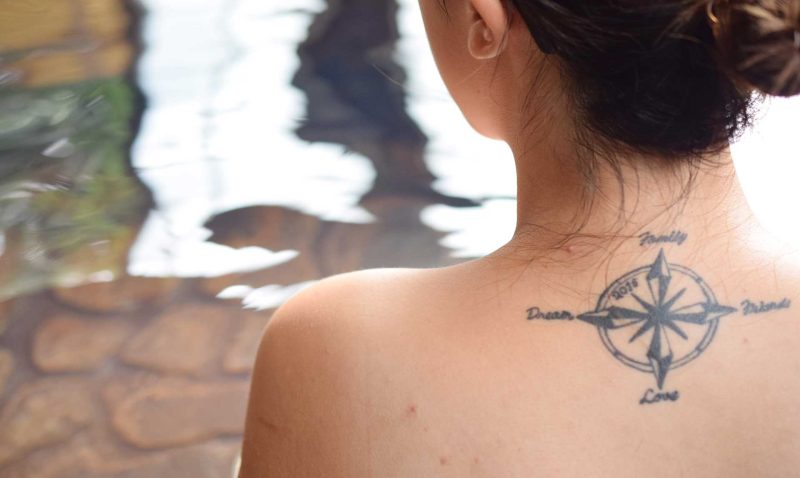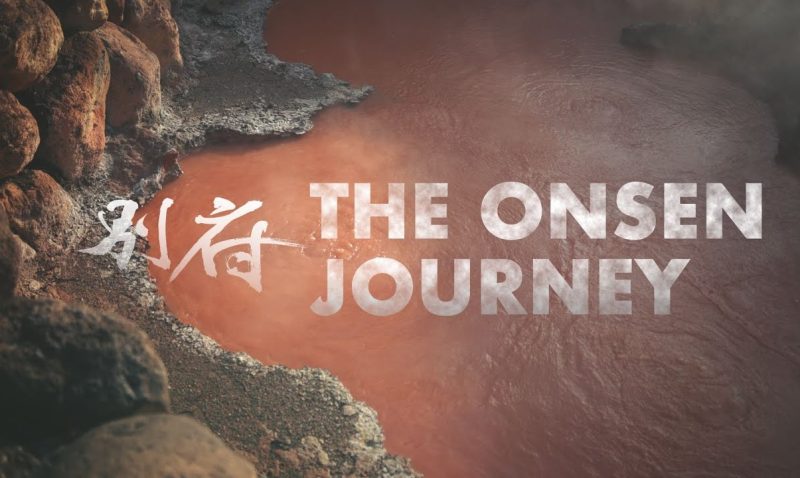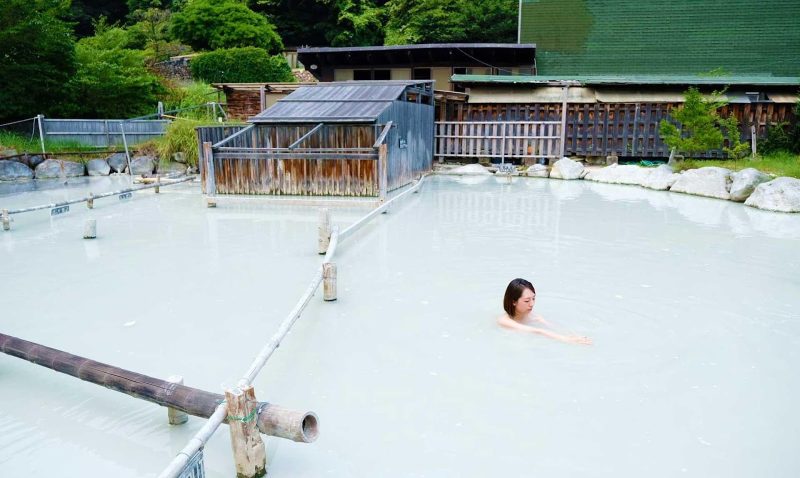
Hello everyone! We are the second-grade internship students at WANDER COMPASS BEPPU (short for Wankon Beppu), a tourist information center at Beppu Station, Oita Prefecture.
For six months from September 2023, We ran through with the mission of “Proposal for Beppu Tourist for Foreign tourists to Japan.”In this article, We would like to reflect on what we saw, learned and felt during the internship.
*It is divided into the first and second parts, and this article will be the second part.Read the previous article here
▶ Our 6-month journey (link to article)
Below is an article that introduced the hidden charm of Beppu that we felt in September and October 2023.Please take a look at it together.
▶ Hide-and-seek Beppu: Unravel hidden Beppu (link to article)
▶︎Beppu relaxing weather on an E-bike (link to article)
The background of the new project
The new plan, “Beppu Onsen Wawo,” is a walking tour to learn about Beppu’s Onsen culture. The main content was made into a tour that introduced Beppu’s history and Onsen culture because through hearings, travelers who visit Japan might need to learn more about Beppu’s Onsen.
In addition, in a conversation with the head of the local Onsen management association, We received an opinion that they were worried about foreigners who might not know the rules of Beppu going into the local onsen. Initially, on the tour, we would bathe together after informing them of the bathing rules. However, after receiving this opinion, we assumed that some tourists want to take a bath in the local onsen but cannot because they need to learn the rules about the local onsen.
In addition, we conducted hearings with about 100 people, mainly tourists from Europe, America, and Australia. As a result, more than 90% of the respondents were interested in Beppu’s Onsen culture and interaction with local communities, and 60% wanted to participate in this new plan.
Now that we have confirmed the matching of the purpose of the plan with the interests of tourists, we started to carry out the tour to see the reaction and value of travelers who have actually experienced the plan.
Hypothesis testing
To test the hypothesis, we conducted four tours, one for international students living in Beppu and three for tourists who had actually visited Beppu.
Trial with friends
We conducted a trial tour with our friends as guests before conducting a test tour with actual travelers. During the trial, we encountered a problem where the participants were not informed about the activity of entering the hot springs with the guide. This led to a surprise for them when they had to suddenly bathe with the guide. Moreover, although we had initially planned to visit Takegawara Onsen together, we decided to visit Umeyu Onsen instead during the trial tour. This decision was made to cater to travelers who were not used to hot water.
Beppu Onsen typically has high temperatures, with many hot springs exceeding 42 degrees Celsius. Nonetheless, Umezono Onsen has lower temperatures, allowing visitors to enjoy the onsen leisurely. However, the feedback we received from the participants showed a keen interest in Takegawara Onsen after hearing about it during the tour and seeing its retro atmosphere. They expressed a desire to visit Takegawara Onsen instead, which prompted us to reflect from the travelers’ perspective.
BEPPU WAWO Tests
We conducted tests three times to validate our content hypotheses and the appropriateness of our pricing.
The first participant is from New Zealand, currently residing in Osaka, and frequently visits Beppu because of work.
Overall, the tour received high satisfaction, with comments such as, “I’ve been to Beppu many times before, but there were so many things I didn’t know.” Interestingly, it seems the participant had visited Takegawara Onsen in the past but only saw the exterior and did not take a bath. Additionally, he mentioned never having bathed in local hot springs before and revealed he had only used hotel hot springs. Therefore, they expressed, “Even though I’ve been to Beppu many times, it was a great experience for the first time.
Another issue we discovered is that even though we informed participants before the start of the tour that we would be going to the hot springs together, participants understood it as us going to see the hot springs together and introduce them, rather than actually bathing together. Since bathing in the hot springs is the main highlight of our tour, we also realized the need to focus on how to convey the correct tour details to the participants.
The participant for the second tour is from Germany, he had been to Japan many times due to work, but this is his first time visiting Beppu.
Since this tour was arranged in a short time, we did not bathe in the hot springs together due to the time limit. However, we provided detailed information about our full tour to him, including a walking tour and bathing in a local hot spring. In response, he said, “That’s a really great idea.” He mentioned that he felt unsure about the rules and did not know how to behave in the hot spring in Japan. “There are probably many people with similar worries, and it would be amazing to have the guide bathe with us, especially with someone who can speak English.” It also showed that one of our hypotheses was confirmed.
The participants for the third tour were a couple from France. They were the most corresponded to our target for the project, and they showed great interest in listening to our guide’s explanations. During their one-month trip across Japan, they visited various regions outside of cities and prioritized experiences, closely resembling the persona we had set. They were individuals who ventured beyond urban areas to explore different parts of the country and valued experiential travel.
For this tour, we implemented a full tour that included station area guidance, hot spring bathing, and a meal (Japanese rice ball making) along with interaction. Drawing from insights and feedback gathered from previous tours, we made an effort to improve and deliver a comprehensive experience.
We received feedback after the tour ended, and the participants expressed, “We were very satisfied!” It seems that experiencing the hot spring together while the guide shared information about the culture and etiquette was perceived as a very special and valuable experience.
Lastly, we received feedback suggesting that to justify our assumed price of 3,500 yen, they would appreciate it if the walking tour portion could be extended a bit longer. The reason behind this request was their love for photography and the desire to explore more locations to capture various scenes.
“Beppu Onsen Wawo” Final project
Our final proposal for “Beppu Onsen Wawo” is a tour where participants can experience the town’s scenery, learn about Beppu’s hot spring culture, and enjoy local hot spring experiences immersively. Based on feedback gathered from our tour implementation, we will expand the area of walking tours to include visits to local specialty shops and standing bars. Additionally, we are considering increasing the options for hot spring bathing to accommodate participants’ preferences. Considering costs and profits, the tour price is set at 3,500 yen per person, following thorough research and consideration of participant opinions gathered during the planning phase.
About mission and our value
After conducting the test tour, we could hear feedback from the perspective of foreign travelers. Here are some comments from the participants:
- “I’d like to buy local specialties and souvenirs and experience various routes.”
- “I think young people who like new experiences would be interested in participating.”
- “Thank you for explaining the rules and other aspects of Japanese hot spring culture.”
- “It was educational to learn detailed information and history about Beppu that I didn’t know before.”
- “Although I’ve been to Beppu many times, it was a great experience for me.”
- “I don’t think I would have bathed in the local hot spring if it weren’t for the tour.”
- “It was great to not only experience but also learn about history.”
These feedbacks also align with the values we aim to convey through BEPPU ONSEN WAWO:
1. Immersive
Starting from Beppu Station and heading towards the hot springs, we pass through various alleys, witnessing the daily life of Beppu residents. It’s not just the tourist areas but also residential areas where people live their real lives. We introduce interesting stories and fun facts about Beppu, its historical development, and the birth of the hot spring community. Then, together, we enter the hot springs, explaining how to enjoy the local hot springs properly and highlighting the characteristics of Beppu’s hot springs. This provides a complete experience of the “Beppu residents’ daily routine from home to the hot springs.” This is our immersive hot spring experience in Beppu.
2. Authentic
Beppu is renowned throughout Japan for having the highest volume and widest variety of hot springs. It ranks first in Japan and second worldwide for the volume of natural hot spring water. Hot springs are not just a tourist attraction in Beppu; they are part of people’s daily lives. In Beppu, hot springs are not exclusive to resorts, nor do you need to travel to remote mountainous areas. You can enjoy natural hot springs in the city, near your home. We guide travelers to experience the most authentic local hot spring culture by carefully selecting hot springs that embody the unique characteristics of Beppu’s local hot springs. This offers a cultural experience vastly different from hotel public baths and serves as the starting point for our Authentic approach.
3. Transformative
The feedback we received from travelers after participating in the activities highlighted many positive experiences. Many expressed how fascinating it was to explore the small alleys and learn fun facts about Beppu, experiences they wouldn’t have had without our guidance. When entering the hot springs together, we also received numerous positive comments. Participants felt that experiencing the local hot spring culture was fantastic. They gained a deeper understanding of Beppu and had a more profound experience of its hot springs. Seeing tourists express surprise, happiness, and anticipation during our guided tours because of the information and experiences we provide is the most meaningful reward for us.
Not only does our unique immersive hot spring experience culture offer travelers a refreshing change, but we must also convey accurate information about hot spring culture. This allows travelers to get closer to Beppu’s hot spring culture, removing language barriers to experiencing the culture. Many people come to Beppu but have few chances to experience the local traditional public hot springs due to a lack of understanding or fear of breaching etiquette. This is a sentiment we’ve heard from many respondents in our surveys. Hot springs are a cultural hallmark of Beppu, and we are committed to bringing travelers the most authentic local tourism experiences.
What did we learn from the internship?
Throughout our internship, we have embraced new challenges, learned from our failures, and iterated for improvement. In this section, we will lead you into the insights and realizations we gained during our internship. We’ll explore the trials and errors involved in creating plans beneficial for both inbound travelers and the local community, as well as the importance of not losing sight of the local perspective.
Seohyun:
Performing the role of tour planning and guide, I had an opportunity to deeply explore the nature of travel and the value people gain through experience. This experience went beyond just the pleasure of traveling, and was an opportunity to re-light the importance of cultural and human interaction. The most important thing in the process of planning and executing the tour was to provide meaningful experiences to travelers. The act of traveling means more than just looking at a new place. People experience new cultures, expand their worldview through interaction with others, and have the opportunity to get out of their daily lives and look back on themselves. It is the role of tour planners and guides to enable such experiences, and I value this responsibility very much. He also realized the importance of personalized experience. All travelers have their own unique tastes and interests.
Therefore, when planning the tour, I worked to meet various needs and expectations. To this end, we strengthened communication with participants and actively reflected their feedback to adjust the tour contents. This approach provided participants with a more personalized travel experience, resulting in higher satisfaction and memorable moments. Finally, tour planning and guiding activities provided me with opportunities to constantly learn and grow. My efforts to gain a deeper understanding of the history, culture and people of each destination have made me a more mature person. Meeting diverse people also improved my social skills and gave me a broader view of the world. In conclusion, while acting as a tour planner and guide, I realized that travel can play an important role in building bridges between personal growth and culture beyond simple leisure activities. The insights and enlightenment gained through this experience will serve as my compass in the future journey.
Yuzu:
Looking back on our journey, we learned some precious lessons from the changes we implemented for the project. Due to the nature of this internship, it was crucial to translate our hypotheses. We transformed experiments on paper into tangible results. In the implementation process, we have also critically examined our shortcomings. Through the lens of a social perspective, we gained a deeper understanding of Beppu as a place.
Despite living in Beppu, we realized that our perceptions of tourism in Beppu differ from those actively involved in the tourism industry. Our experience has shown us that supporting onsens is more complex than initially thought. For instance, we believed that the “Beppu Onsen Guardian” would not only resolve the lack of manpower to clean local onsens but also provide a unique tourist experience for visitors and bring innovation to Beppu’s onsen scene. However, we discovered that this solution would not substantially benefit the current local onsens but rather challenges. Additionally, tourists were only somewhat receptive to such a socially beneficial tourism experience. We realized our initial expectations differed after conducting interviews with residents and tourists. We are grateful for the opportunity to rectify our initial oversights and learn to approach the issue more comprehensively. In our final project, “BEPPU WaWo,” I discovered my role in the various arrangements for this project to contribute to Beppu. My responsibility was to guide visitors to the onsens and introduce them to fun facts about Beppu and small stories that I found interesting. My internship at WCB allowed me to participate in many local events in Beppu. Through these events, I discovered many of Beppu’s attractions, which I always share with my friends when I take them to Beppu to eat and drink. Having this opportunity to bring the Beppu I usually experience to others is significant.
REN:
On the first day of our internship, I never imagined that the result would be a tour to experience Beppu’s hot spring culture.What I have learned in the past six months is the importance of looking at things objectively and repeating hypotheses and verification.
When the tours were created, I wondered in the back of my mind whether foreigners would accept the idea of “taking a hot spring bath with someone unfamiliar” and whether they would find value in it. However, I was simply surprised to find that a larger percentage of them actually accepted it. Thus, during these six months, I experienced over and over again that making hypotheses about problems and questions, rather than perceiving things subjectively and then testing them and finding awareness, led to the next step. Thanks to this experience, I was able to eliminate my assumptions and take action to try to pay attention to different things.
Finally, I believe that the result was led because of the three of us. On the first day of the internship, we shared our strengths with each other based on the results of “StrengthsFinder”. However, we were all very different in our personalities and strengths. As time went on, there were more and more times when the differences in our personalities became very apparent. In fact, there were many conflicts during the last six months. However, the common thread that ran through the strengths of our three very different personalities was “adaptability”. It was because of this common strength that we were able to resolve our many conflicts in the end. And I think it was because we respected each other.
Based on many people’s feedback and advice, we started focusing on a new project. We surveyed more than 100 tourists to test the hypothesis and received help from experts. Thanks to this, we could plan a tour that provided satisfaction to tourists and helped local residents’ lives through test verification. Through this internship, we succeeded in planning, and it served as an opportunity to grow ourselves. Our six-month internship in Wonder Compass is over, but won’t it be a compass for the rest of our lives?
Thank you for reading our article.


